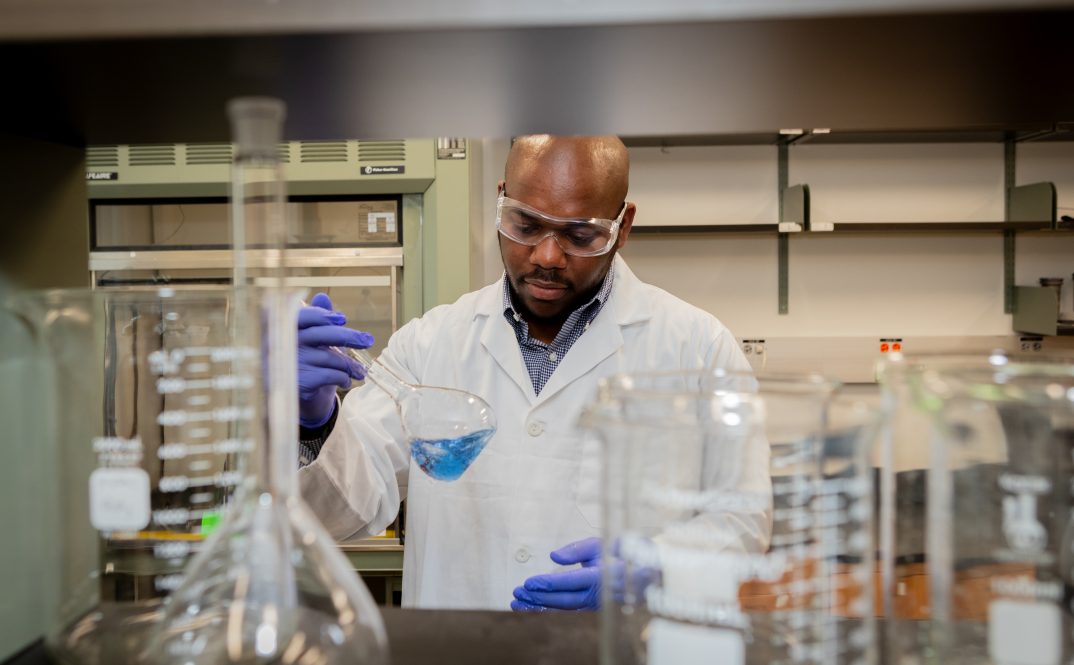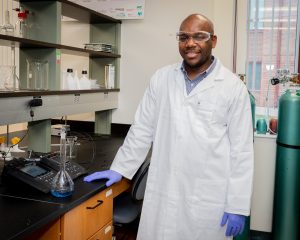UConn Ph.D. student wins prestigious Activate Fellowship for his research involving cleaner and more cost-efficient ammonia production

Laron Burrows's work at UConn has focused on revolutionizing ammonia production with a new reactor that reduces both costs and energy consumption. (Christopher LaRosa / UConn College of Engineering Photo)
Laron Burrows, a Ph.D. student in Chemical Engineering at UConn's College of Engineering (CoE), has been selected as an Activate Fellow, the first UConn student chosen for this prestigious fellowship. The fellowship will support Burrows' work advancing the technology he developed during his doctoral research at UConn under the guidance of Professor and Associate Dean of Research George Bollas. Burrows's startup, Andros Innovations, is focused on revolutionizing ammonia production with a new reactor that reduces both costs and energy consumption.

Founded in 2015, Activate empowers scientists and engineers to reinvent the world by launching startups to address climate change and other environmental challenges. The Activate Fellowship, which provides $300,000, is a two-year immersive experience that equips science entrepreneurs with the skills, networks, infrastructure, and funding they need to quickly and effectively bring their groundbreaking research to market.
"This recognition reflects the work I have been doing to address the inefficiencies of a process that has remained largely unchanged for over a century," Burrows explains. "Traditional ammonia production is highly inefficient and produces an exorbitant amount of CO2 emissions, which contribute significantly to global warming. The low-cost energy-efficient reactors that Andros is developing can enable a switch to low-carbon fertilizers, ammonia as a hydrogen carrier, and as a sustainable marine fuel.
Ammonia is an inorganic chemical compound of nitrogen and hydrogen. It is a colorless, highly irritating gas with a sharp suffocating odor, and dissolves easily in water to form ammonium hydroxide solution. It is a vital ingredient for fertilizers and also is used as a refrigerant gas, for purification of water supplies, and in the manufacture of plastics, explosives, textiles, pesticides, dyes, and other chemicals. Ammonia also is produced from the natural breakdown of organic matter.

Burrows has been actively involved in UConn's entrepreneurial ecosystem, winning the 2023 Innovation Quest and being named a 2023 Summer Fellow at the Connecticut Center for Entrepreneurship and Innovation (CCEI). He is also part of UConn's Technology Incubation Program (TIP). His startup, Andros Innovations, won awards at the MIT Climate and Energy Prize and the Yale Innovation Summit, and is a member of high-profile startup programs such as Third Derivative and MassChallenge.
For the past year, Burrows has been doing his research and lab work onsite in Storrs, where he currently is testing a bench-top reactor prototype. He hopes to have a commercial version of his reactor, which will be about the size of a standard refrigerator, completed within the next three years. His unit, he explains, operates at atmospheric pressure (14 psi), a stark contrast to the existing high-pressure processes employed today (3,000 psi).
His learning at UConn, he says, working with his mentor and the project's principal investigator, Bollas, has been instrumental. Balancing the rigors and demands of creating a startup, he explains, along with the far slower research processes, has been challenging and rewarding. And he cites his advances and recognition as testament to the opportunities and support he has received at UConn's CoE.
"My progress and success reflect UConn's ability to support and encourage high-level research, and is allowing me to be on this prestigious global stage where I can get the attention of multi-billion-dollar global companies in farming-related and manufacturing industries," Burrows says. "About 80% of the ammonia produced by industry is used in agriculture as fertilizer, so continued production is essential. However, in light of the dangers of global warming, safer and more energy-efficient methods are more critical now than ever. I'm grateful to have had this opportunity, and for the recognition."






